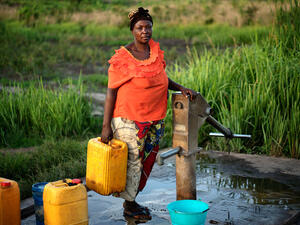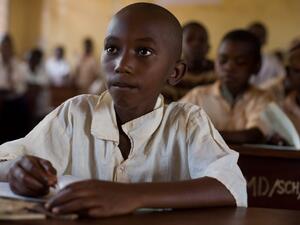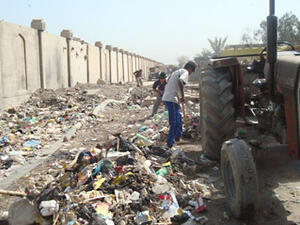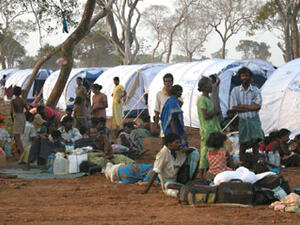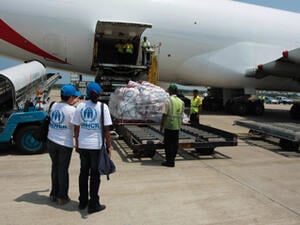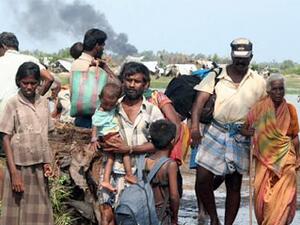Ivorian refugees find novel ways to survive and thrive in Liberia
Ivorian refugees find novel ways to survive and thrive in Liberia

Ivorian children playing in the square of Saclepea refugee camp in eastern Liberia.
SACLEPEA, Liberia, August 18 (UNHCR) - What do you do when the odds are against you? Face the music, keep your hair on and hit the books. Those are some of the ways Ivorian refugees in eastern Liberia are making the most of life in exile, three years after fleeing the civil conflict in their country.
Thousands of people left Côte d'Ivoire for neighbouring countries when fighting broke out between government and rebel forces in September 2002. Many subsequently went back, but about 15,000 remain in Guinea and Liberia. Some 12,000 are believed to be in Liberia alone, most of them integrated locally in the east, while others have made their way to the Liberian capital, Monrovia.
The UN refugee agency runs two camps for Ivorian refugees in eastern Liberia, housing some 150 in the south-eastern town of Harper and more than 660 further north in Saclepea.
Life is hard for the refugees, who live in crowded conditions and worry about loved ones they left behind in Côte d'Ivoire. They have tried to replicate home conditions in exile, creating a village-like camp in Saclepea with small groups of huts divided by greenery and a little square in the centre, where women gather and children play.
The camp population, comprising mostly women, children and the elderly, has divided itself into small groups. While vulnerable people live near extended families, others have included non-kin neighbours into their core group. However, every group prefers not to mix too much with others.
"Everyone here has his own problems," says Gokpan Jules, who fled Côte d'Ivoire in 2003. "Furthermore we belong to different ethnic groups. We have no problems in the camp, but the desire to socialize is not there."
All of them, however, share the same economic concerns. To make a living, some refugees raise chicken and sell eggs at the local market. Others make bricks to build new structures in the camp and to sell building materials to the host community.
UNHCR's implementing partner, the Liberian Red Cross, is helping refugees in building activities and providing them with seeds to grow rice. Some refugees have planted cassava and other vegetables near their huts to ensure a more varied diet than that provided by the World Food Programme.
Yet others have made additional efforts to enhance social and cultural life in and around the camp. Six times a week for six hours a day, Ivorian refugee Jules volunteers at the Saclepea radio station, playing music between news bulletins. The father of five is proud to have found a job in his own profession in Liberia. His colleagues like him and his programmes are well received by locals and refugees alike.
Fellow Ivorian Rita Dago is also providing relief from the mundaneness of camp life. A hairdresser back home, she started a modest salon near her hut in Sacelpea camp, providing beauty services for refugees and passing on her skills.
"I have 25 women in my workshop," she says proudly. "They all want to become professionals like me. And of course I receive clients to do their hair."
The next generation is not forgotten either. In Zwedru, UNHCR has supported the construction of a school where 710 Ivorian children will start the academic year in September. In Saclepea camp, the refugee agency has helped establish a library.
"If we get enough book donations, this could become a recreational place," Ivorian refugee Antoine Tieu dreams aloud. A former law student whose studies were interrupted by the conflict in Côte d'Ivoire, Tieu believes firmly in education and self-improvement.
"Spend so much time improving yourself that you have no time left to criticize others," reads a small painting on the wall of his modest living room. It is a vision he is sharing through a literacy class for adults at the camp, where he teaches French and English for free twice a week.
"People here have to learn how to communicate with the Liberians," he reasons. "If women decide to do some small business in Saclepea, at least they should have the vocabulary to talk about their prices or measures in English."
At the moment, Tieu has 54 female and 15 male students. The teaching keeps him occupied and the social engagement prevents him from falling into depression. To earn some money, he has bought a small generator to make ice cubes which he wants to sell in the town's market.
Although a bachelor, Tieu's responsibility recently increased when his younger brother and family joined him in Saclepea after the situation became unbearable at home.
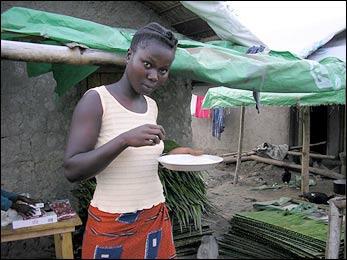
Hairdresser and skills trainer Rita Dago outside her hut at the camp.
Still, he longs to go back to school and complete his studies so he can become a lawyer. Unlike his neighbour Dago who dreams of moving to Canada, Tieu wants to stay in Africa, "in a peaceful country without corruption, if that exists," he says cynically.
In April this year, Côte d'Ivoire's President Laurent Gbagbo, head of the rebel New Forces Guillaume Soro, former Prime Minister Alassane Dramane Ouattara and former President Henri Konan Bedie declared an end to hostilities and war after talks in Pretoria. This could pave the way home for thousands of Ivorian refugees in the region, but many seem to be taking a wait-and-see attitude before returning home.
By Annette Rehrl in Saclepea, Liberia

